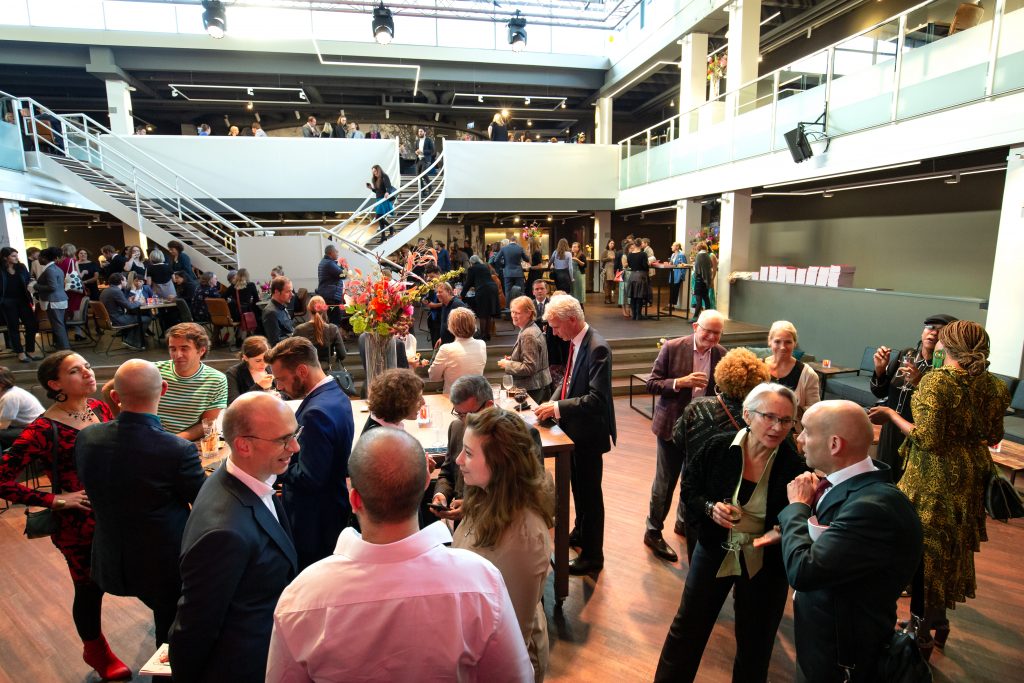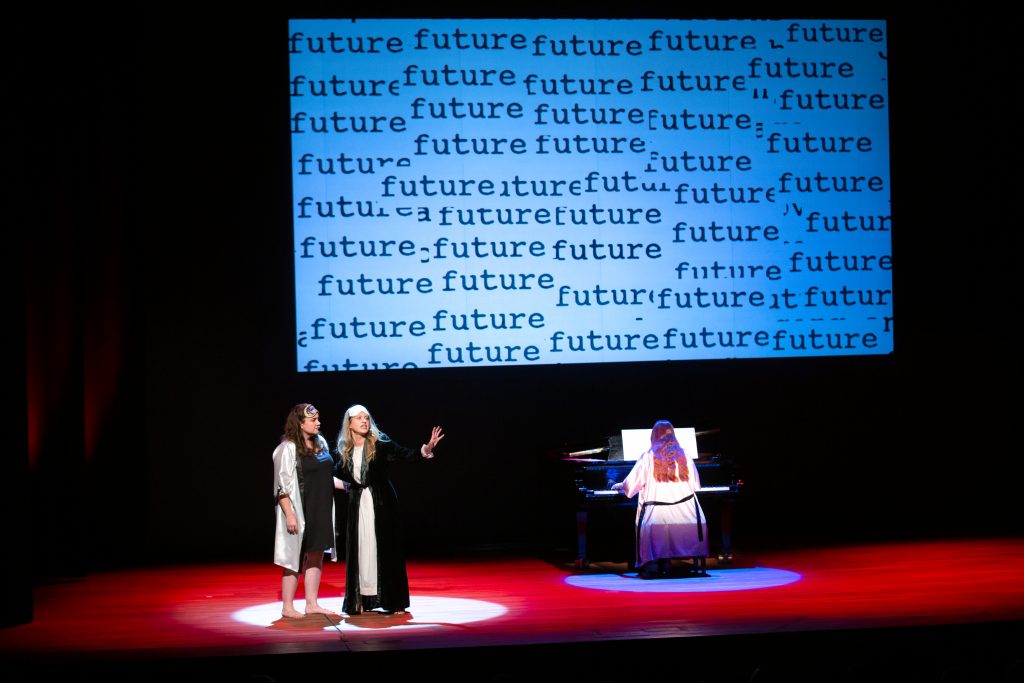
Vivian Paulissen is Head of Programmes of the European Cultural Foundation and a member of the Board of Directors of EDGE (Engaged Donors for Global Equity). She considers herself a privileged ‘activist in residence’ of philanthropy. Here, she addresses the contemporary challenges that foundations and philanthropy in general, are facing in founding their futures.
Originally published in ‘Stories of Europe. 65 years of the European Cultural Foundation, 1954-2019′
Ultimately, it comes down to a very simple fact: we, as foundations, and the act of philanthropy need to be democratised.
Foundations are overwhelmed by the immensity, urgency and complexity of the challenges facing our society. The gaping climate crisis, inequality and injustice, and the flawed system of liberal democracy, are harmful effects caused by the paradigm of growth at all costs and extractivist behaviour. This has come largely at the huge expense of the majority of the people, the planet and other living beings. And there is a bewildering sense that everything is connected to everything else. What role can foundations and philanthropy play in these challenging times? Foundations claim to be more and more aware of the need to act differently and in collaboration in order to make a very much needed transition towards a healthier future for our planet. If not us, then who? But let’s face it: philanthropy, as a field, tends to move at a glacial pace. While many of the challenges we face are systemic – emblematic of the inter- connected, multiple crises of our time – foundations too often merely address the symptoms of these problems rather than their root causes. We tend to promote short-term and single-issue strategies and transactional reforms that reinforce the logic of the dominant system, instead of helping to build alternative approaches. Indeed, we are part of the problem.And yet, although more often than not foundations have been rather ‘laid back’ – stressing their political, structural or institutional limitations – this cautious attitude is beginning to change. Because we all know that it is time to question our role in society very deeply. We need to look at the systems we represent. How do we avoid being part of the problem? And how can we work differently?
Let’s take a close look at some of the challenges foundations need to address with honesty and humility.
Our work is political
Philanthropy certainly needs imagination as the words chosen for the European Cultural Foundation’s 2019 tagline highlight:‘Democracy Needs Imagination’. But what the philanthropic sector needs first and foremost is democratisation. Foundations can no longer remain invisible, and act behind closed doors in a self-sustaining system. We know that foundations and philanthropy as a ‘sector’ do play a role in civil society, democracy and politics. Let’s just face it, philanthropy is, by default, political. Whether we like it or not.
“Is this a political fight? [or, in other words: ‘being political is none of our business!’] Yes, it is – but so is everything else. Trying to keep the status quo or just addressing symptoms, not root causes of problems, as many other foundations do, is also a political standpoint. There is no a-political position in philanthropy. It just happens that a ‘keep things as they are’ approach is not only ‘conservative’, but unsustainable in the face of global inequality, climate change, and resource exploitation. ‘Traditional’, ‘conservative’ or even at times ‘progressive’ philanthropy is not outside of politics. On the contrary: they are often a force for the continuation of current politics, a politics of cosmetic change, not systemic change,”
(excerpt from the Funders Guide on Systemic Change available via the EDGE network).
But we can shift towards another attitude, if we also acknowledge the following.
We are the elites
‘Philanthropy is under attack’ is a statement that we are hearing these days. It is true that, over the past few years, philanthropy has become much more part of the public discourse. Within civil society, foundations are viewed as holding power and privilege. We have to come to terms with this position and acknowledge the tensions that come along with this responsibility. This means becoming more transparent and publicly accountable about how our foundations’ wealth has been accumulated, how we operate, how we invest (now, please, ethically and sustainably!). We can’t keep claiming that we are a-political while we have so much potential to carry out advocacy and be an intermediary force between civil society, politics, business, academia and the media. Don’t we claim to exist for the common good?This is a huge challenge for foundations to deal with, of course, because this needs a profound introspection. But it is also an opportunity, not a threat, al- though admittedly it needs imagination and boldness. If we want to start success- fully addressing what is wrong and what should be done – and by whom – we have to democratise our own way of working.
With 1% of the world’s population holding 45% of the world’s wealth, foundations are part of the elite. Along with the demand for a redistribution of wealth worldwide come questions like: Who de- fines the strategy? Who decides what to fund? And what is in the interest of the common good? We know we hold power, because we have the luxury of acting with our resources. We have to be responsible and open about our assets and look once again at our foundations’ ethos, practice and vision. If foundations are open, transparent and honest about their failures, and if they join forces with other foundations, then philanthropy can really be a major player. Building bridges and advocating for the common good represents a tremendous opportunity that could fuel a historic transition that will benefit all living beings.
So yes, it is a hugely responsible role to play in a world in which: a) politicians can’t manage to handle the multiple crises coming their way and are struggling to restore the trust of voters; b) there is still a prevailing for-profit driven economic and political system; and c) individualistic leaders put their own interests above those of the people and the planet.
Maybe some philanthropists are also activists, taking action through money. In foundations we see positive change- makers. People who stretch the limits of their organisations from within, who want to renew, rebuild, rethink the role of foundations in society. It is no coincidence that foundations attract people from NGOs, social movements, politics, academia, advocacy, public institutions or independent cultural forces. We know only too well that if philanthropy has limitations, so do these sectors, actors and institutions. In philanthropy, at least, one can shift resources and power for the sake of democracy, to- wards a redistribution of wealth, towards equality, taking risks through trial and error.
We are privileged to work in philanthropy, as it is at the intersections of so many different sectors. It is exciting to revisit our foundations beyond the (admittedly true) money-is-power dogma and to reconfigure our role in society with a spirit of openness. Philanthropy has the power to move resources, but we had better act responsibly with them.
“‘Philanthropy is under attack’ is a statement that we are hearing these days. It is true that, over the past few years, philanthropy has become much more part of the public discourse. Within civil society, foundations are viewed as holding power and privilege. We have to come to terms with this position and acknowledge the tensions that come along with this responsibility.”
The money belongs to the people
In traditional grantmaking, foundations have the monopoly on decisions concerning the distribution of their funds. Sometimes they hire experts or advisors from the field, but they have the final say. This seems quite logical, but we have to realise that ‘their money’ is not really their money. It has been accumulated – often in a rather questionable way – and then at some point it was committed to a certain issue relating to inequality, social or environmental injustice. If we look at it this way, it makes sense that the people who are affected by those issues are also the ones making the decisions. Usually, however, they are not represented in foundations, and if they are, it’s a very selective group of people who do not necessarily represent diverse stakeholders or the affected communities at large. If we consider that money (still) is power, then that power is also concentrated within philanthropy: among a very small number of people. Thus, structures in foundations reflect what is wrong with society at large.
In the case of the European Cultural Foundation, which was neither founded by a wealthy individual or family nor by a corporation, being publicly ac- countable is even more paramount. The Foundation is in essence a (semi-)public foundation, whose core funding since the late 1950s has come from people who are trying their luck in the Dutch lotteries. We are a strange player in philanthropy and the world of foundations: our activities are funded with the money people spend gambling. So we better be explicit about what we fund, how we operate and what our position is. There have been honest attempts to reinvigorate our operations in the public interest, among them, Fund- Action: a pilot for a citizen-run fund that draws on our available resources. This is participatory grantmaking as a tool for democratisation.
Participatory grantmaking: much more than the newest fashion
FundAction was co-launched in October 2017 by the European Cultural Foundation together with the Open Society Initiative for Europe, the Charles Leopold Mayer Foundation and the Guerrilla Foundation. Two other foundations joined over the course of the past two years – the Lankelly Chase Foundation and Un Monde par Tous. Unsurprisingly, these foundations are all committed to working differently and have found common ground to experiment and learn within EDGE – a global progressive network of foundations with a European branch. Before the launch of FundAction, we experimented with other ways of grantmaking. We wanted to work with partners rather than sticking to traditional grantmaking whereby the ‘donor-versus- recipient relation’ obstructed mutual knowledge exchange and collaboration between philanthropy and civil society. FundAction may be considered the culmination of the European Cultural Foundation’s ongoing learning and reassessment of the relation with its grantees.
Foundations consider these new ways of participatory grantmaking as a more democratic and just process of decision-making. At the end of the day, aren’t the people in the field, the people we sup- port, the ones who know best where the money should be spent? Or where the greatest needs are in terms of knowledge exchange, capacity building, research, experimentation and lobbying…?
In this up-and-coming, fashionable new model of grantmaking, a foundation can declare its imagination to be democratic. But, as much as this is interesting and necessary, there has to be more to it. Shifting the power and gaining mutual respect between funders and grantees, sharing and benefitting from each other’s (different) skill sets, can only be done when a new relationship is built with trust, patience, trial and error.
The exceptional case of Fund- Action is not the participatory element of grantmaking where foundations ‘allow’ citizens to co-decide on what should be funded. The term ‘participatory’ says it all – it is somehow still asking someone to participate in an existing framework. FundAction, however, was developed in a democratic way from the start. The group of foundations came together in 2016 to form the idea for FundAction with active citizens. They outlined the intention, values and structure of the fund. Democracy, inclusivity, openness, peer-to-peer working, transparency, trust, respect and autonomy are the values that both the foundations and the civil society actors involved are committed to upholding.
As such, FundAction is a European living mechanism, a daring pilot that is non- institutional, not static, not perfect. It is an opportunity for foundations to learn and adapt to new times. Although it is becoming fashionable amongst foundations that are looking for a quick fix solution to the demands of society to be more democratic and accountable to communities’ needs, participatory grantmaking addresses power and privileges in philanthropy. But it is not a quick fix solution by any means. Participatory grantmaking is a confrontational and sometimes difficult way of assessing your foundation’s own operations, core values and exclusive position in society. But it is also a great way to start sharing privilege, power, experience and knowledge.
Collaboration means diversity
Since the current crises we face are felt across the globe, it makes sense for us to look at a global practice for philanthropy. This is being discussed in different progressive foundations’ networks, which rightly address an urgent need for more trans-continental collaboration, pooling resources and knowledge. And although foundations should definitely collaborate across sectors and localities, we have to be mindful of our different contexts.
A US vision of progressive philanthropy in particular is gaining interest in Europe. We can learn a lot from new ways of ‘doing’ philanthropy that include much more actively and openly joining in with (political) proclamations of social movements that fight for racial and gender justice. Addressing the living legacies of colonialism and patriarchy must be at the core of European foundations’ strategies. They are root causes of many problems, but the way we strategise about these issues can’t be dominated by an Anglo-Saxon narrative.
There is no such thing as one global language when superdiversity is all around us: simplifying this can become confusing. In Europe alone there is al- ready an immense diversity of languages, cultures, histories and politics. Individual countries deal differently with contemporary challenges, like migration and xenophobia or socio-economic fragmentation. Can we be allies across these differences, for the same cause? We need European philanthropy to come together, for a narrative and practice that is grounded in Europe’s diversity.
The need for a new narrative emerges when we feel a disconnection between the system and what we experience and imagine. We don’t need one new story: we need a narrative that underpins the multiple and diverse stories of many people, with different visions, traditions, cultures, languages, beliefs and identities. A narrative is a structure of many stories that provides a connection between them. It is in the connections between these stories that the European power lies: a force that relates to what people think, it relates to events in the past and present and imagines the future in a non-linear way. We need everyone to contribute to a new progressive and not exclusive narrative, yes. But we have to do it knowing there are different contexts, so we can start the dialogues between people with different stories, even if we are all facing the same global challenges.
In order to encourage more collaboration across foundations in general – globally or at a European level – we must do extra work to interrogate our own individual foundations’ ways of thinking, frames of reference, cultural assumptions and professional habits. We need to come together in our diversity, finding the best ways to complement and challenge each other to engage in joint action
All in all, foundations need people; they need democracy; they need honesty, participation, accountability, diversity and true collaboration. Philanthropy as a commons may be a (utopian) ideal to work towards. But why not work towards a collective management of resources that is open, sociable and participatory. Why not? We can do it!



Leave a Reply
You must be logged in to post a comment.